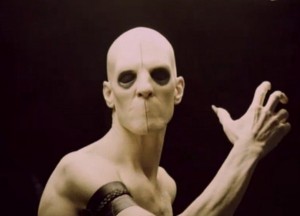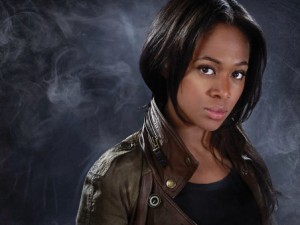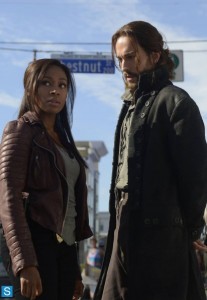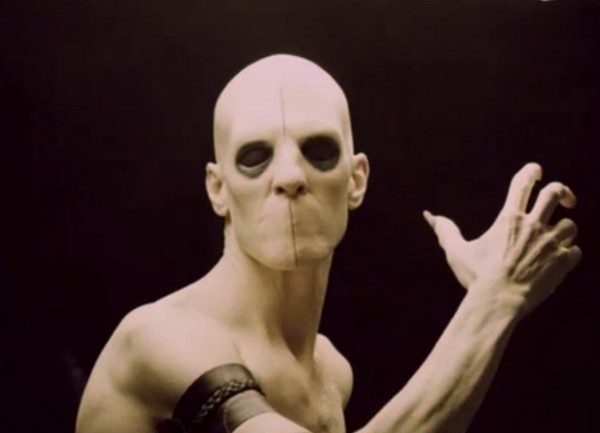“The last thing we need,” Captain Irving tells Abbie and Ichabod as they begin this week’s investigation, “is another episode of The Twilight Zone.” Fortunately, the Sleepy Hollow creative team disagreed. Like a lot of Twilight Zone episodes, “For the Triumph of Evil…” combines spooky supernaturalism, strong characterization, and clear-eyed morality into an exciting and entertaining whole. (In the dream sequence at the end, Ichabod even walks through a door not unlike the one from Twilight Zone’s opening credits.) This new series’ third episode is its strongest one yet.
With one caveat.
Mythmaking with Mohawks
 I don’t know what Mohawks may think about Sleepy Hollow rummaging through their religious beliefs (ostensibly) the same way it rummages through Christian ones in the service of the series’ mythology. The only references I found to Ro’kenhrontyes in an (admittedly quick) Internet search were to this episode. I assume this “faceless nightmare monster” is one more made-up piece of Native American lore from Hollywood’s endless supply—a visually stunning, convincingly creepy piece, but made-up just the same.
I don’t know what Mohawks may think about Sleepy Hollow rummaging through their religious beliefs (ostensibly) the same way it rummages through Christian ones in the service of the series’ mythology. The only references I found to Ro’kenhrontyes in an (admittedly quick) Internet search were to this episode. I assume this “faceless nightmare monster” is one more made-up piece of Native American lore from Hollywood’s endless supply—a visually stunning, convincingly creepy piece, but made-up just the same.
Likewise, Ichabod’s assertion that “many of our Mohawk friends were colonist spies… invaluable to the cause” doesn’t withstand a fast fact-check. I guess some individual Mohawks could have sympathized with Washington’s army (especially because Ichabod’s “37th regiment” seems fictional; the only Revolutionary-era military division I located by that name is the British Army’s 37th Regiment of Foot). But according to Grolier’s New Book of Knowledge, “there were far more American Indians who sided with Britain. Joseph Brant, the leader of the Mohawks, remained loyal to Britain… [and] was even made a captain in the British Army.”
I like the idea that, in 1781, Ichabod was living on the right side of history—advocating abolitionist legislation, sharing “peace pipes” around “powwow” campfires—but it’s ironic that an episode that (however briefly) acknowledges injustices perpetrated against indigenous tribes goes on to perpetrate some imaginative injustices of its own, revising colonists’ Revolutionary-era relations with Native Americans to make the series’ main white, male character look good, and inventing out of whole cloth a “dream demon” who, even though it is punishing sinful behavior (more on this later), is “some evil minion” to be stopped.
It all smacks of the very pablum Seamus Duncan (played by Michael Teh, late of Sharknado) both despises and shrewdly trades on as the owner of “Geronimotors” (I do think that name’s a brilliant touch). When Ichabod mentions Ro’kenhrontyes, Duncan asks, “You want me to go all kemosabe and cast a spell and do a rain dance?” He seems rightly offended that Ichabod and Abbie expect him to know all about the demon simply because Duncan’s a Mohawk. Of course, it turns out he does know all about it, so score one more for Hollywood.
As Sleepy Hollow mythology, I think Ro’kenhrontyes is brilliant. I also suspect it’s easier for me, as a non-Native American, to look past its faux Mohawk trappings in order to enjoy it.
Telling the Truth
I liked so much about this episode:
- We properly meet “Miss Jenny” (played by Lyndie Greenwood), as Ichabod calls her with delightful deference. She is clearly someone to be reckoned with, and has some mysterious part to play in the End of Days. “It’s all over but the crying,” she warns Ichabod, leaving us to wonder what she knows that he, and we, don’t.
- We get intriguing hints about Captain Irving. After Luke confesses that he hung the “decapitated” equestrian crossing sign in Irving’s office (revisiting the pilot’s sharpest visual joke), Irving defies expectations by enjoying the prank but also telling them, “Assume I know everything.” That seems an appropriate assumption for a character named after the author of this show’s source material, and hints that he is more than meets the eye. For good or for ill? Only time will tell.
- Ichabod’s disgusted spit-take of the energy drink may be predictable, but it’s still darn funny. Less amusing, but equally welcome given the attention thus far to Abbie’s past mistakes, is Ro’kenhrontyes’ comment to him, “Your sins are not mine to judge.” I suspect skeletons may soon start rattling around in Ichabod’s closet—perhaps in connection to the reasons Katrina didn’t immediately like him?
 But I especially enjoyed the remarkably rich treatment of fear, guilt, and sin this episode provided. I wasn’t expecting to. When I heard sandy-eyed Ichabod tell Abbie, in her dream in the episode’s teaser, “The truth will set you free,” I smirked. “Typical,” I thought, “another Bible verse ripped out of context!” The “truth” this phrase invokes is not some concrete, empirically verifiable fact or an abstract, Platonic ideal, but Jesus Christ, who is the truth, the way, and the life (John 14.6). He tells those following him, “If you continue in my word, you are truly my disciples; and you will know the truth, and the truth will make you free” (John 8.31-32). But as I thought longer, I realized Dream Ichabod’s quotation isn’t too far out of context; for when Jesus’ audience asks him what he means, he explains, “Very truly, I tell you, everyone who commits sin is a slave to sin… [I]f the Son sets you free, you will be free indeed” (8.34, 36).
But I especially enjoyed the remarkably rich treatment of fear, guilt, and sin this episode provided. I wasn’t expecting to. When I heard sandy-eyed Ichabod tell Abbie, in her dream in the episode’s teaser, “The truth will set you free,” I smirked. “Typical,” I thought, “another Bible verse ripped out of context!” The “truth” this phrase invokes is not some concrete, empirically verifiable fact or an abstract, Platonic ideal, but Jesus Christ, who is the truth, the way, and the life (John 14.6). He tells those following him, “If you continue in my word, you are truly my disciples; and you will know the truth, and the truth will make you free” (John 8.31-32). But as I thought longer, I realized Dream Ichabod’s quotation isn’t too far out of context; for when Jesus’ audience asks him what he means, he explains, “Very truly, I tell you, everyone who commits sin is a slave to sin… [I]f the Son sets you free, you will be free indeed” (8.34, 36).
As Sheriff Corbin the Friendly Ghost told Abbie last week, and as Ichabod realizes this week, Abbie has for too long been living as a prisoner to fear. Ichabod’s awkward, temporally challenged question of her in the pilot—“I presume you have been emancipated?”—takes on new, spiritual meaning if we see Abbie as still enslaved to the same fear that led her to deny the truth about the Demon in the Woods over a decade ago. Ichabod tells her that fear leads to inaction and pain. To put his syllogism in theological terms, fear leads to sin.
Does this depiction of Abbie diminish her? I don’t think so; I think it makes this incredibly strong character all the more realistic and relatable. I find Abbie’s reasons for staying silent completely understandable. I don’t think I would’ve been any braver than she was, had I been in her place. But sin, even when committed for understandable reasons, remains sin. Sleepy Hollow’s moral vision is clear here: Abbie was wrong to let Jenny down in her time of need, and Abbie needs to tell that truth if she is to find freedom. She needs Jenny’s forgiveness, she needs to forgive herself—and, though the show doesn’t say it, we can: she needs God’s forgiveness, too.
 The good news is, God forgives sin and frees from fear. God doesn’t sic Sandman demons after us in our dreams to wrack us with guilt and punish us with pain. “If we say we have no sin,” wrote John, “we deceive ourselves, and the truth is not in us. If we confess our sins, he who is faithful and just will forgive our sins and cleanse us from all unrighteousness” (1 John 1.8-9).
The good news is, God forgives sin and frees from fear. God doesn’t sic Sandman demons after us in our dreams to wrack us with guilt and punish us with pain. “If we say we have no sin,” wrote John, “we deceive ourselves, and the truth is not in us. If we confess our sins, he who is faithful and just will forgive our sins and cleanse us from all unrighteousness” (1 John 1.8-9).
Abbie’s declaration to Ro’kenhrontyes is an almost ideal confession of sin: “I lied to protect myself. I was a coward and I betrayed my sister. I turned my back on her when she needed me, and I will not do it again. It was my fault… I’m not afraid anymore.” Abbie not only acknowledges the truth of her sin but also repents and turns from it when she goes to visit and, presumably, try to reconcile with Jenny. (It’s not Abbie’s fault Jenny has escaped!) I say “almost ideal” because, for Christians, confessions of sin are never defiant declarations of a fearlessness we’ve mustered up on our own, but humble admissions of our guilt before God: “God, be merciful to me, a sinner!” (Luke 18.13). Yet we, too, end by saying, with Abbie, that we are not afraid. We fear no demon (literal or otherwise) that assails us, nor do we fear judgment—God’s, other people’s, or our own, often crippling self-judgment. “If God is for us, who is against us?” (Rom. 8.31).
Who indeed?
All Scripture quotations are from the New Revised Standard Version.


Awesome review that touched on things that I didn’t think of at first.
I will say I have been hesitant to write up a review for this episode because I find that I am arguing with myself.
LIGHT SIDE (of the force) : I like the show. I like the characters and how they are developing. I totally enjoy Ichabod and his more formal like speech countered by Abbie’s present day American talk. I think the interplay between them is great and I want more. This week just propelled the drama forward between them further connecting them and building bonds of trust. For example, Ichabod runs around the back of the house to save/support Abbie. Another example, his insistence on joining her in the “dream” world to face the demon (long named thingy). I thought it was neat how they took a kind of folktale/myth character–the sandman–and turned it on its ear (one of the reason I like “Once Upon a Time” so much). So I am here to stay for the show.
DARK SIDE (of the force) : The show should be offensive to me. As a Christian and a firm and solid believer in the Bible as truth, the mixing and connecting of Christian theology with Native American mythos should slap me in the face. And that does not count the aforementioned (by Michael) haphazard use of Scripture. On top of this, there is an element of unbelief in the shows established mythos. For example, where is the headless horseman? I mean if he was so hot and heavy in the pilot to get his skull back why is he suddenly sitting back in the wings playing cards and not tearing up the town at night–every night–to get his skull back. To which I would add is only in the police station and easily retrieved by the horseman of even by one of the demon’s other sympathizers. In this episode, while I liked the way it really moved forward the characters, the sandman has absolutely nothing to do with the horseman nor his army of evil as presented as a character who has been “haunting” Native Americans for at least two centuries, so why go after Abbie and crew now. There was no explanation as to what supposedly triggered the Sandman’s appearance other than for making an episode in the show and personally I think the writers should be a little better than that. It would not have taken much. And my biggest disappointment is in the fact that this is turning into a monster of the week show which in general I like but was expecting something different from this show based on the pilot.
LIGHT SIDE : But I like the show and the characters!!!
DARK SIDE : But there are so many holes.
LIGHT SIDE : No show is perfect and the use of quoted Scripture is cool albeit often out of context.
And this goes on an on …
I am hooked on the show and am looking forward to next week even if I am mad at myself for doing 🙂
I think your point about “where’s the Horseman” is a great one, and they should address it sooner rather than later. If all the other monsters o’ the week (presumably) are paving his way, why did he show up in the pilot? On the other hand, maybe Ichabod’s resurrection, not his, was the precipitating event – maybe the forces of good/God/whomever gave Ichabod a “head start.” I know the opposite was said to be true in the pilot (at least if I remember right – the Horseman arose, so Ichabod had to, too), but that would be one easy tweak to the still-developing mythology: the Horseman wasn’t really ready to ride.
I can’t say whether you should or shouldn’t be offended by the show. It’s an interesting question, and I suspect some Christians are, in the same way that some are offended by Harry Potter, the Wizard of Oz, etc. I’m not — not yet, anyway. I don’t think it is obligatory upon Christians to take offense when biblical stuff is used as fodder for make-believe. On the one hand, I guess it might be a stumbling block for some; on the other hand, I don’t think any of our stories threaten God, and many of them bear witness, even unwittingly, to The Story (as we talk about a lot around here!).
I’d have more of a problem if it was a “devil quoting Scripture for his own purposes” sort of thing, but Ichabod seems like an all right guy (though not perfect any more than Abbie is, I suspect – and, as I said in the review, she hasn’t been diminished at all in my sight by this week’s revelations, just made more real), trying to sort it out and do good as best he can. I’ve got no problem rooting for folks like that.
Something I meant to mention above but neglected was that, as the Truth, Christ must be present wherever truth is found. Wherever truth is setting people free, he’s at work.
I sure find it surprisingly compelling. Thanks for continuing the conversation!
I agree with you. And I am not offended. There is just a small part of me that wonders if I should. But I have never been the type to be quick to take offense. I like to think that is a good quality 🙂
I am kind of posting again because I forgot to click the notify me of comments and don’t want to miss that this time so I know when someone joins our conversation LOL!!!
I started something new on my multi-blog site for reviews and put up my review for this episode at http://wp.me/p3YDcC-p
Jose Molina, one of the writers or producers, tweeted that the WORD Ro’kenhrontyes, at least, is Mohawk for “throwing sand.”
Missed your comment earlier, Alta… That’s interesting! Thanks for pointing it out.